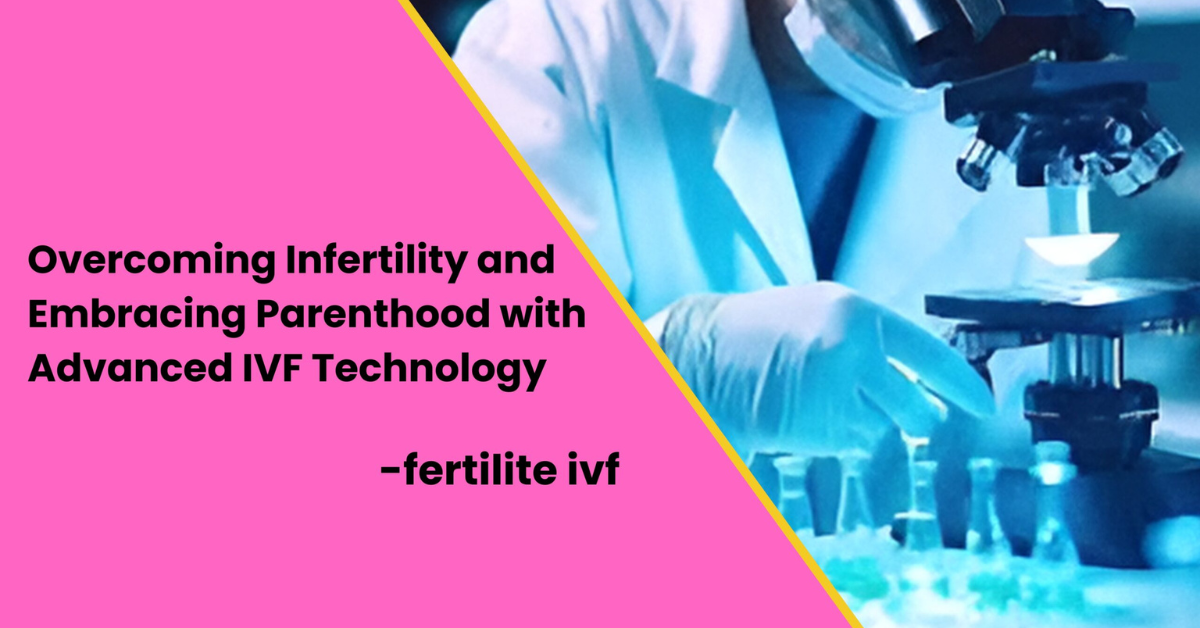IVF Center Near Me: Your Complete Guide to Choosing the Right Fertility Clinic
For many individuals and couples, starting a family is a cherished dream. However, not every journey to parenthood is smooth. Fertility challenges can be emotionally, physically, and mentally overwhelming. In such cases, In Vitro Fertilization (IVF) has emerged as a beacon of hope. If you’ve been searching for an “IVF Center Near Me,” you’re already on the path to taking charge of your reproductive health.
This article is designed to help you understand what IVF is, how to choose the right IVF center near you, what to expect during the treatment process, and how to prepare yourself emotionally and physically for this life-changing journey.
What is IVF?
In Vitro Fertilization (IVF) is an assisted reproductive technology (ART) that involves retrieving eggs from a woman’s ovaries, fertilizing them with sperm in a laboratory, and implanting the resulting embryo into the uterus. IVF is commonly used when other fertility treatments have failed or when certain medical conditions make natural conception difficult or impossible.
Who Needs IVF?
IVF is recommended for individuals or couples facing the following conditions:
-
Blocked or damaged fallopian tubes
-
Ovulation disorders
-
Endometriosis
-
Low sperm count or poor sperm mobility
-
Unexplained infertility
-
Genetic disorders
-
Age-related fertility decline
Same-sex couples or individuals who wish to become parents with donor sperm or eggs may also opt for IVF.
How to Find the Best IVF Center Near You
Searching for an IVF center near you can feel overwhelming due to the sheer number of clinics available. Here are some tips to help you make an informed decision:
1. Look for Certification and Accreditation
Choose a center that is accredited by recognized health authorities. Accreditation ensures that the clinic maintains high standards in terms of medical ethics, staff training, and safety.
2. Check Success Rates
One of the first questions to ask any fertility clinic is about their IVF success rates. While success depends on many factors (age, health conditions, etc.), a consistently high success rate indicates strong medical expertise and technology.
3. Evaluate the Medical Team
Ensure the clinic has a team of experienced fertility specialists, embryologists, nurses, and counselors. A compassionate, communicative, and knowledgeable team can make a significant difference in your experience.
4. Assess Infrastructure and Technology
A well-equipped lab with modern IVF technology is essential. Ask about equipment used for egg retrieval, embryo freezing, and genetic testing.
5. Read Patient Reviews
Check online reviews or testimonials to understand other patients’ experiences. Positive feedback and transparency in communication are good signs.
6. Consider Location and Accessibility
Proximity matters. IVF treatment involves multiple visits. A center close to your home or workplace can reduce stress during an already emotional process.
The IVF Treatment Process: Step-by-Step
Understanding the IVF process can help you prepare mentally and emotionally. Here’s a general outline of what you can expect:
1. Initial Consultation
The journey begins with a comprehensive consultation where your medical history, hormonal levels, lifestyle factors, and reproductive health are evaluated.
2. Ovarian Stimulation
You’ll be given fertility medications to stimulate the ovaries to produce multiple eggs. Regular ultrasounds and blood tests will monitor the response.
3. Egg Retrieval
Once the eggs are mature, they are retrieved through a minor surgical procedure under light anesthesia.
4. Sperm Collection
A sperm sample is collected from the partner or a donor. It is then prepared for fertilization.
5. Fertilization
The eggs and sperm are combined in a lab. In some cases, a single sperm is injected directly into an egg using a technique called ICSI (Intracytoplasmic Sperm Injection).
6. Embryo Development
Fertilized eggs are monitored for 3–5 days as they develop into embryos.
7. Embryo Transfer
A healthy embryo is selected and transferred into the uterus. This procedure is typically painless and done without anesthesia.
8. Pregnancy Test
About 10–14 days after the embryo transfer, a blood test is performed to check for pregnancy.
Emotional and Mental Preparation for IVF
The IVF journey can be emotionally taxing. It’s essential to take care of your mental health along the way. Consider the following:
-
Counseling Support: Many IVF centers offer psychological support or counseling services. Don’t hesitate to use them.
-
Join Support Groups: Talking to others on the same path can be healing.
-
Mindfulness and Stress Reduction: Techniques such as meditation, yoga, and breathing exercises can promote emotional well-being.
Lifestyle Tips to Improve IVF Success
While medical expertise plays a vital role, certain lifestyle changes can enhance your chances of success:
-
Maintain a healthy weight
-
Eat a balanced diet rich in antioxidants
-
Avoid alcohol and smoking
-
Exercise moderately
-
Take prenatal vitamins, especially folic acid
-
Get adequate sleep
IVF for Single Parents and LGBTQ+ Individuals
IVF is also a viable option for single men, single women, and LGBTQ+ couples. With options like egg/sperm donation and gestational carriers, modern IVF centers offer inclusive fertility care tailored to different family-building goals.
Ethical and Legal Considerations
Before beginning IVF, ensure the clinic provides complete transparency about:
-
Consent forms
-
Embryo storage policies
-
Use of donor gametes
-
Number of embryos transferred
It’s important to fully understand your rights, responsibilities, and options throughout the process.
Red Flags to Watch Out For
While many IVF centers offer exceptional care, some might not meet professional standards. Avoid clinics that:
-
Guarantee success (no clinic can!)
-
Withhold information or rush decisions
-
Have poor hygiene and outdated equipment
-
Lack qualified staff or counseling support
Conclusion
Finding the right IVF center near you is more than just choosing a facility — it’s about finding compassionate experts who understand your dreams, concerns, and hopes. By educating yourself, asking the right questions, and trusting your instincts, you can embark on this journey with confidence.
No two fertility journeys are the same, but with the right care and support, your path to parenthood can be one filled with resilience, hope, and ultimately — joy.
Frequently Asked Questions (FAQs)
Q1: How long does the IVF process take?
The IVF cycle, from ovarian stimulation to pregnancy test, usually takes 4–6 weeks. However, it may vary depending on individual response and medical planning.
Q2: Is IVF painful?
IVF involves some discomfort, especially during injections and egg retrieval, but most patients find the pain manageable. Mild cramping and bloating are common side effects.
Q3: What are the chances of success with IVF?
Success depends on factors like age, fertility issues, and lifestyle. Younger women tend to have higher success rates. Your fertility specialist will guide you based on your profile.
Q4: Can IVF be done without hormones?
Natural IVF cycles without hormone stimulation are possible but may result in fewer eggs and lower success rates. Your doctor will recommend the best approach.
Q5: Is IVF safe?
IVF is generally safe, but like any medical procedure, it carries some risks, such as ovarian hyperstimulation syndrome (OHSS) or multiple pregnancies. Regular monitoring minimizes these risks.
Q6: Can IVF be used if I already have a child?
Yes. Secondary infertility is common, and IVF is often used by couples who have trouble conceiving a second time.
Q7: Is there an age limit for IVF?
Although there is no legal age limit in many places, success rates decline with age. Women over 40 may be advised to consider donor eggs for better results.
Q8: How do I choose between fresh and frozen embryo transfer?
Both methods are effective. Frozen embryo transfers allow more flexibility, especially if the uterine lining needs time to recover. Your doctor will help decide what’s best for you.







